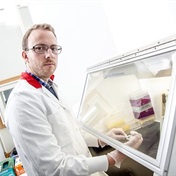A mid-stage trial has shown that a type of gene therapy can reduce the symptoms of advanced Parkinson's disease.
The 45-patient study is the first successful trial to compare gene therapy to a sham surgical procedure. A report is scheduled for publication online in Lancet Neurology, the trial was sponsored by Neurologix Inc, which is developing the treatment.
The idea behind the therapy is to replace faulty genes or augment the activity of beneficial genes, but safety and efficacy concerns have held back the field, which first emerged some 20 years ago. An Arizona teenager died in a 1999 gene therapy trial, while in another two people developed leukemia as a result of such treatment.
In the Parkinson's trial, the delivered gene controls production of glutamic acid decarboxylase (GAD), which controls the neurotransmitter GABA.
GABA calms overactive neurons, and its production is lost in Parkinson's, resulting in the debilitating movement problems that mark the disease.
Results
After six months, the treated group showed a 23.1% improvement on a scale of Parkinson's symptoms, compared with a 12.7% improvement for patients who received sham surgery, according to the published research.
"We still don't know for how long the benefits of this treatment may last, or whether there may be long term problems due to introducing viruses into the brain," Dr Michelle Gardner, research development manager at Parkinson's UK, said in a statement. "In addition, any new treatment must be shown to be more effective than those currently available for Parkinson's –which this treatment has not yet been shown to do."
The trial results include only those patients with infusions delivered to the correct area of the brain. There were also a few cases where the pumps delivering the treatment malfunctioned and those cases were also taken out of the analysis.
The final analysis included 16 patients who received active treatment and 21 who received the sham surgery.
"The treatment was remarkably well tolerated, with mostly only mild adverse events in the AAV2-GAD treated group that were felt to be unrelated to the treatment, and completely resolved," Dr Andrew Feigin, the study's lead author and associate professor of neurology and molecular medicine at the Feinstein Institute for Medical research in Manhasset, New York, said in a statement.
The most common side effects were headache and nausea.
Neurologix said in a statement that it is in discussions with US regulators over the design for a phase III trial of the gene therapy, which it plans to submit later this year.
(Reuters Health, Deena Beasley, March 2011)
Read more:




 Publications
Publications
 Partners
Partners










